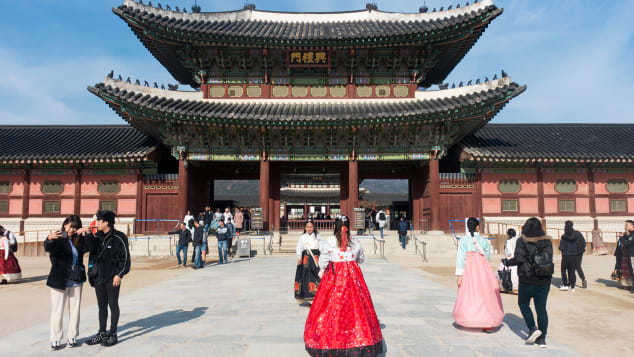This is how covid-19 impacted geisha 3:37
(CNN) -
Walking into Pandora Cheng's qipao rental store in central Hong Kong is like traveling back in time.
A brown leather Chesterfield sofa sits in one corner next to a record player, facing rows and rows of custom-made qipaos, China's traditional high-necked dress.
Cheng offers Hong Kong tourists "dress experiences" that use fashion as a way to explore culture.
She was inspired by geisha makeovers in Japan and other "cultural dress" activities she has participated in on her travels.
"I think that if tourists dress in the qipao like us, they can get into the culture, (explore) the old style of Hong Kong," he says, adding: "It is an experience to get to know a culture in depth."
But for many tourists traveling abroad, the idea of "dressing" in the clothing of another culture can raise doubts about cultural appropriation ... and make them reluctant to do so.
So what are the rules?
Cultural appropriation or appreciation?
When looking at issues of cultural appropriation, it's important to consider who the cultural "insider" is and what the power dynamics are, says Erich Hatala Matthes, professor of cultural ethics at Wellesley College in Massachusetts.
The culture is "in constant transformation, evolution and hybridization", and determining who is an insider or a stranger in the culture "will always be a negotiation," he adds.
Matthes states that, in cases such as geishas or qipaos, tourists are invited by people from within the culture, but it is often outsiders who pose problems of cultural appropriation, for example, on social media. social.
advertising
The qipaos are often called cheongsams in English.
Credit: Shutterstock
"Context is the key to thinking about appropriation allegations," says Matthes.
"If there are cases where people from Japan or China invite tourists to wear these clothes, refusing because you are concerned about cultural appropriation ends up being a kind of problematic assertion of your authority to delineate what is acceptable in that context."
Furthermore, it adds that this can have negative economic consequences for traditional artisans who depend on the sale of handicrafts or typical cultural experiences to earn a living.
Artisan manufacturing of face masks allows these deportees to face the economic crisis due to the pandemic
While an invitation from a culture connoisseur usually means that the activity will be one of appreciation and not cultural appropriation, social media "tends to decontextualize" situations, says Matthes.
However, he does not believe that the answer is that people do not share these experiences on the Internet, as it can help to "get more customers" for those who decide to share their culture with tourists.
Matthes says that the most important thing for visitors to culture is to listen: "Try to be respectful to those who have cultural knowledge and experience, and listen to what they tell you about how to wear clothes or how to act respectfully within that context. ".
A symbolic dress
Cheng is one of the "cultural connoisseurs" who invites foreign tourists to try on a qipao at her rental store in Hong Kong.
Although the dress is symbolic for Cheng, she does not believe that it should be reserved for traditional wear, or only worn by those of Chinese descent.
"The qipao doesn't have such a strong meaning," he says.
Also known as a cheongsam, the once a loose-fitting everyday staple, the qipao became popular in Shanghai in the 1920s and became more and more fitting as women gained more control over their lives. and their bodies.
"The qipao is a starting point of (Chinese) fashion, and also the starting point of women's independence," Cheng says.
She opened her store in 2017 to offer tourists a tangible way to connect with the fast-disappearing old Hong Kong.
Diana at 60: How would the Princess of Wales have dressed in 2021?
With over 200 handcrafted cheongs to choose from, clients can choose from a range of styles and sizes handcrafted by Cheng, and then can do their hair and makeup for an additional price.
Afterward, accompanied by a photographer, patrons visit nearby historic sites such as Man Mo Temple and Cat Street Antique Market for a photo shoot (starting at $ 164).
Travelers, some of whom wear traditional hanboks, gather in Seoul.
Credits: Shutterstock
Before the pandemic, most of his clients were foreign tourists.
Now, its main visitors are people from Hong Kong looking to explore their city in a new way.
With the strict regulations on the use of covid-19 masks in the city, Cheng expanded the retro photo sets in his store so that people could immerse themselves in old Hong Kong without going outside.
In addition to advertising on Airbnb Experiences, Klook, and KK Day, Cheng has partnered with local hotels, such as the traditional boutique Hotel 1936 and the Grand Hyatt Hong Kong, to offer "qipao stay experiences."
He says that many Hong Kongers have not worn a qipao before or had the opportunity to connect with its cultural meaning.
Hong Kong begins to lose its appeal to expats
"Hong Kongers love this garment, but they can't find what they want to wear. That's why we rent the qipao, for them and other (tourists) to experience it," says Cheng.
Preserve the ancient arts
Cultural dress experiences have proven popular with foreign and domestic tourists from across Asia.
In South Korea, a government initiative launched in 2013 allows free entry to the five palaces of Seoul to anyone wearing a hanbok, the Korean national dress worn by both men and women.
This initiative aims to preserve tradition, educate people and "popularize and globalize" hanbok, says Danny Park, executive director of the Korea Tourism Organization (KTO).
As a result, there are now many local businesses around the palaces that offer hanbok rental as well as accessories and hairdressing.
"Most Koreans like to see tourists wearing different styles of hanbok in Korea," Park adds.
Like Cheng, KTO partnered with the Grand Hyatt Hong Kong to offer a Korean-inspired stay that included a hanbok-wearing experience.
With a tea ceremony and a virtual reality tour of famous landmarks, the package offered Hong Kongers ashore an immersive experience in Korea, Park says, in the hope that it will inspire them to visit it in the future.
Purple island in South Korea attracts tourists 1:05
Dressing up as a geisha, one of Japan's attractions
In Japan, the experience of dressing up as a geisha and wearing a kimono is another of the most common activities on the bucket list.
Tokyo's Studio Geisha Cafe offers full geisha and samurai makeups, which its founder and second-generation wig maker, Mitsuteru Okuyama, launched 15 years ago to teach foreigners and locals about Japanese culture and the art of "katsura" ( wig making).
Before the covid, Okuyama affirms that half of his clients were foreign tourists, mainly from the United States and Europe.
By offering experiences for both men and women, Okuyama welcomes a diverse mix of people into its store.
Although Okuyama is delighted to dress anyone up as a geisha, including "Good Morning Britain" host Richard Arnold, his only condition is that men must shave before ordering the full face of "shiro-nuri" (white makeup). .
Mexico accuses Zara, Anthropologie and Patowl of "cultural appropriation"
Okuyama's mission is to show "the true form" of geisha art, preserve the culture, and correct cartoons and misinformation.
"Geisha sometimes appear in American movies, and it's too unreal," says Okuyama.
Okyama points out that it is not offensive for foreigners to dress as geisha, as long as they do so appropriately.
Hoping to familiarize foreigners with authentic Japanese etiquette and culture, Okuyama says he wants to offer tourists an immersive and enjoyable experience.
"I just want them to have fun with Japanese culture," he says.
ChinaCultureJapan














